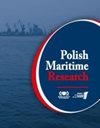船用电厂废气气-空冷却器部件合理设计值的确定
IF 2
3区 工程技术
Q2 ENGINEERING, MARINE
引用次数: 0
摘要
运输船队船舶动力装置的现代化改造,以满足国际海事组织的要求,是一个迫切需要解决的科学技术问题。目前,船用柴油机广泛采用催化选择性过滤器、干湿式洗涤器系统和废气再循环。分析了使用喷射气体-空气冷却器作为减少排放的另一种方法。然而,这种装置的使用并不能中和发电厂发动机的有害排放物,而只是增加了废气的体积浓度。但是,通过将有害排放物的浓度降低到不超过最大允许浓度的值,这将有助于提高有害排放物扩散的效率。它的效率取决于柴油机的负载方式。结果表明,在发动机负荷为100%时,燃烧产物中有害物质经新鲜空气稀释后的初始浓度降低了约50%。得到了发动机负荷降低75%和50%时,废气浓度和温度的降低值,这取决于风挡角。事实证明,喷射式气体-空气冷却器可以成为符合现代环境参数的有效附加手段,特别是当船舶在世界海洋的特殊区域时。本文章由计算机程序翻译,如有差异,请以英文原文为准。
Determination of Rational Design Values for Gas-Air Coolers Components of Exhaust Gases of Marine Power Plants
Abstract Modernisation of marine power plants in the transport vessel fleet to satisfy the requirements of the International Maritime Organization is an urgent scientific and technical problem. Currently, the use of catalytic selective filters, dry and wet scrubber systems and exhaust gas recirculation for marine diesel engines is widely used for this purpose. An analysis of the use of ejection gas-air coolers is presented as an additional method of emission reduction. However, the use of such device does not neutralise the harmful emissions of power plant engines, but only increases the volume concentration of their exhaust gases. But this will help to increase the efficiency of dispersion of harmful emissions, by reducing the concentration of harmful emissions to values not exceeding the maximum permissible concentrations. Its efficiency depends on the load mode of the diesel engine. It is found that the initial concentration of harmful substances in combustion products due to their dilution with fresh air at 100% engine load is reduced by about 50%. The values of the reduction of the concentration and temperature of exhaust gases with the reduction of the engine load to 75% and 50% depending on the louvre angle are obtained. It is proved that ejection gas-air coolers can be an effective additional means for compliance with modern environmental parameters, especially when vessels are in special areas of the world’s oceans.
求助全文
通过发布文献求助,成功后即可免费获取论文全文。
去求助
来源期刊

Polish Maritime Research
工程技术-工程:海洋
CiteScore
3.70
自引率
45.00%
发文量
20
审稿时长
>12 weeks
期刊介绍:
The scope of the journal covers selected issues related to all phases of product lifecycle and corresponding technologies for offshore floating and fixed structures and their components.
All researchers are invited to submit their original papers for peer review and publications related to methods of the design; production and manufacturing; maintenance and operational processes of such technical items as:
all types of vessels and their equipment,
fixed and floating offshore units and their components,
autonomous underwater vehicle (AUV) and remotely operated vehicle (ROV).
We welcome submissions from these fields in the following technical topics:
ship hydrodynamics: buoyancy and stability; ship resistance and propulsion, etc.,
structural integrity of ship and offshore unit structures: materials; welding; fatigue and fracture, etc.,
marine equipment: ship and offshore unit power plants: overboarding equipment; etc.
 求助内容:
求助内容: 应助结果提醒方式:
应助结果提醒方式:


